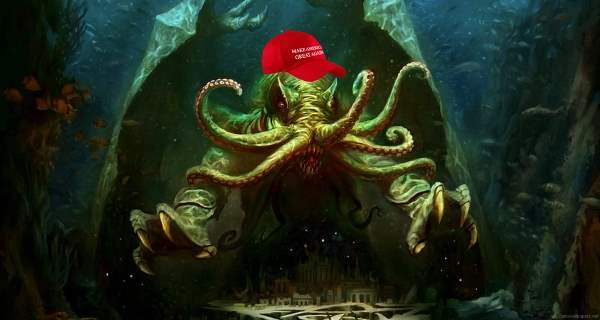Whispers From R'lyeh
Sep. 8th, 2020 06:03 pm Yesterday one of my readers pointed me to this astonishing essay. It's by Andrew O'Hehir, the executive editor of Salon, and it poses in its own half-coherent way a question that I've been exploring since early 2016 -- whether the rise of Donald Trump marks a significant watershed in America's collective life, one of those inflection points at which forces from outside the tawdry calculations of ordinary politics surge into action and send events careening down a course next to nobody predicted. O'Hehir has his own colorful way of saying this, of course:
Yesterday one of my readers pointed me to this astonishing essay. It's by Andrew O'Hehir, the executive editor of Salon, and it poses in its own half-coherent way a question that I've been exploring since early 2016 -- whether the rise of Donald Trump marks a significant watershed in America's collective life, one of those inflection points at which forces from outside the tawdry calculations of ordinary politics surge into action and send events careening down a course next to nobody predicted. O'Hehir has his own colorful way of saying this, of course: There's much to savor in that paragraph. To begin with, it was entirely reasonable and logical that Trump won the 2016 election. Hillary Clinton ran a stunningly inept campaign that alienated more voters than it attracted, and in particular gave working class voters in the battleground states no reason to think that her election would be anything but a disaster for them. She ran a poor campaign, Trump ran a better one, and so despite her initial advantages, he eked out a narrow win: such things have happened many times in American politics.
To O'Hehir, though, that possibility is literally unthinkable. To him, Trump has to be something supernatural, unstoppable, ablaze with demonic power. He compares Trump to Cthulhu, among other horror-fiction figures -- he's not original in that, of course; it's a source of immense amusement to me that horror writer Stephen King, of all people, has made the same comparison -- and sees echoes of Lovecraft's story "The Call of Cthulhu" in the way that the media and the public can't stop obsessing about the man. Of course O'Hehir insists that Trump's eerie power is purely something that has been projected on him by Americans for "mysterious but deeply troubling reasons" -- nothing, but nothing, terrifies the comfortable classes of our society more than the possibility that there may be anything, anywhere, that human beings don't ultimately control.
Still, by bringing in H.P. Lovecraft's most iconic creation, O'Hehir has given away the game.
The central theme of Lovecraft's best stories, "The Call of Cthulhu" very much among them, is the recognition that human beings are clueless about the realities that surround them: "We live on a placid island of ignorance in the midst of black seas of infinity, and it was never meant that we should venture far." The protagonist of a classic Lovecraft story begins to find puzzling clues hinting that something strange is going on beneath the bland predictable surface of his ordinary life. Bit by bit, the clues add up, until protagonist and reader alike discover to their horror that the world they thought they inhabited is a thin crust of comforting delusion over eldritch and unfathomable abysses.
If you know Lovecraft's biography it's easy to see why that theme had such compelling force for him. He was a child of privilege who spent his entire life sliding deeper and deeper into poverty and marginality, publishing stories for a penny a word with cheap pulp magazines because no more serious or lucrative venue was interested in his work, building dreamscapes by turns gorgeous and nightmarish as a refuge from a world that showed no concern whatsoever with his opinions about what it ought to do or be.
That's the experience O'Hehir is chronicling here. He has all his reassuring ideas about what's reasonable and logical, all his canned talking points about how Trump is sure to lose, but there's a whispering voice from drowned R'lyeh telling him that those ideas matter only inside his own head. The dread he feels is the dread of a privileged class that suddenly discovers that the world is not what their ideology insists it must be, and the power they thought was theirs permanently is slipping out of their hands. For now, he can project that dread onto Donald Trump; what has only begun to sift its way into his darkest dreams is the cold terrifying realization that Trump is not an anomaly but an inevitability.
Some of the "mysterious but deeply troubling reasons" for that could be explained to O'Hehir by any working class family in flyover country, or for that matter anyone else who's been on the wrong end of forty years of policies that benefited the comfortable classes at everyone else's expense. Some go far deeper. None of them have any place in the sanitized version of reality O'Hehir thinks he lives in. Still, as Lovecraft knew well -- and as O'Hehir seems to be realizing bit by bit, as the clues pile up -- the universe is serenely uninterested in how the executive editor of Salon thinks it ought to behave.